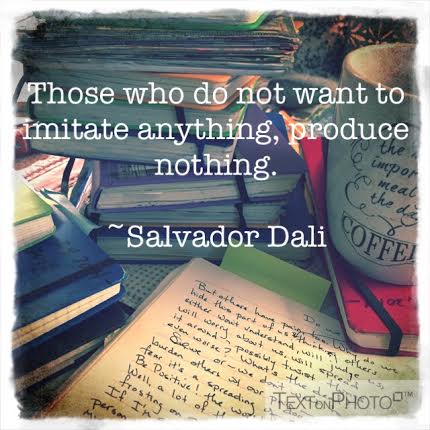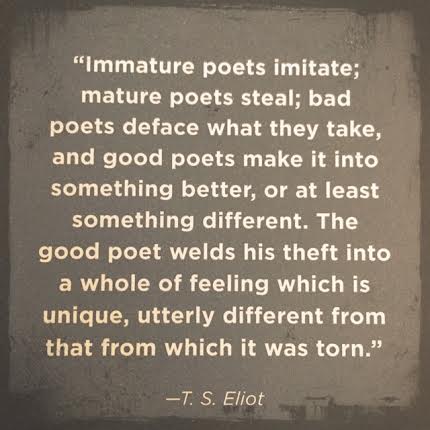
My day began with coffee, feeding Sandy and mining old notebooks. Every so often, these old friends call on me to revisit past pages, reflect on where I’ve been and look for patterns or ideas that are begging to be attended to.
I love words. Seriously, I do. Word Crazy. My notebooks are filled with glittering gems collected from other writers, singers, artists, thinker-people and from conversations. There’s a lot of garbage in my notebooks, too – not fit for the outsider’s eyes.
Most of the good stuff in my notebook . . . is not my own. It’s stolen from other places. Words jotted down because they have a hold on me. I recycle them into my own writing in hopes that they can be crafted into my own voice authentically.
But sometimes, I worry.
When does a writer give credit to where words come from and when can we steal words and rework them into something unique, using them in a different context and not feel obligated to cite the source? (Yes, this is the research/grad student coming out here.)
It’s muddy waters.
I don’t know how many times I’ve written, “They were like puppies in church,” or “We melted into the furniture.” These are memorized phrases from Anne Lamott’s writing that I’ve used in both my talking and my writing. Do I credit her? Who owns a metaphor? or a simile? or a phrase? Is there even an original source? Do we go by word count?
Listening to the radio today, lyrics from Blake Shelton’s song, Mine Would Be You, nudged me to write them down,
What’s the greatest chapter in your book?
Are there pages where it hurts to look?
These words reach out and grab you. I will use them somewhere. Do I have to make sure I say they are from Blake? or his song writer? Do I revise these two sentences to make them my own before I can use them?
In my notebook are these words copied down from somewhere, a comment from a lady on a blog.
I’m glad to be on this journey at the same time as you, wonderful-writer-thinker-lady.
Dang. I adore how that sounds. I imagine being given the gift of these words and feel my heart well up. I had to keep them safe somewhere. They have become etched in my brain and they have come out in my writing. I have no idea where they came from.
The idea of being accused of plagiarism can stop a writer in their tracks.
Worse yet, it can make you not write anything at all for fear that everything you have is really from somewhere else.
Again, the image of Austin Kleon’s book, Steal Like An Artist, immediately comes to mind. I get up and snatch it from my shelf. Page one of Austin’s book has these words:

Every single page of this book is a gold mine. I have to fight the urge to underline each line because of its brilliance or way it is written. Have you ever read a book that has a hold on you in that way? I have so many books full of my notes and sticky notes that they resemble more of a fan than a book (yep – I stole that simile somewhere).
Austin teaches us that nothing is original. “The writer Jonathan Lethem has said that we people call something ‘original’ nine out of ten times they just don’t know the reference or the original sources involved.”
and he writes. . .
“French writer Andre Gide put it, “Everything that needs to be said has already been said. But, since no one was listening, everything must be said again.”
This is true for anything. Writing, art, and teaching. Much of what some educators claim is “new” is actually a mashup or remix from the work of John Dewey or Paul Freire, Marie Clay or Fountas and Pinnell, Donald Murray or Donald Graves. We need to pay homage to these thinkers. Who do we think we are to claim something brilliant our own? Insane. (I’m looking down at my feet here.)
I really don’t know where I was going with this. It’s still a worry/wonder, yet it’s not going to stop me from collecting and studying the work of those I love. Our work becomes the product of those we read, study or are with. We are the sum of all these parts. Eventually, it all becomes a part of us and we don’t know where it comes from.
So, choose carefully.
If you have never been to Austin Kleon’s site, you need to get yourself some coffee, find a spare hour and head on over there. And, then of course, you’ll need to go see Chase Jarvis. These two give a person so much inspiration that it is difficult to get any of those chores on your to-do list done. No lie. You’ll be off creating. . .
Shari 🙂
I’m participating in twowritingteachers March Challenge of posting a blog post every day for the month of March. While I’ve missed a few days, I’m still in it for the long haul! To check out other writers, visit here.


I relate to this so much. I think about it all the time. As writers we are always on the lookout for inspiration. A show, a saying, a conversation. But we take those things and make them our own. Sometimes it’s a fine line, I know.
LikeLike
Love-love Steal Like an Artist…
I fret over this topic frequently; so your slice made me feel as if I’m in good company!
LikeLike
Shari, your thoughts are fresh and new in all their stolen and newly arranged words! I adore this reflection and the truths you share. I am bookmarking this post so that I can take time to look up all the sources you reference. Looks like lots of good material to stea…I mean get inspired by!
LikeLike
Afraid to visit the sites you mention since I can so easily get lost! I’ll bookmark it for later. Have I told you how much I love your Bookworm Girl?
LikeLike
To me stealing and being inspired are not the same. When we take others words, run with them, and turn them into something new a n exciting, that’s not stealing but inspiration.
LikeLike
I loved following your thinking here- you are right, the lines can be fine and often it is divided by outsiders who define what is plagiarism and what is inspiration. Your post definitely had me thinking!
LikeLike
My notebooks are full of quotes too–sometimes unattributed! I get excited about something I’m reading and jot it down quickly and then forget to write where I found it. ARGH! I wonder if writers and non-writers have differing views on plagiarism vs. inspiration. For me, everything I read becomes something I might work with in some way, and it would probably be impossible to trace every idea back to its original source. Btw, I love Austin Kleon too. Planning to show his TED Talk to my Creative Mind students in a couple of weeks and spend some serious time on his blog. Will definitely check out Chase Jarvis’s site too–looks like a goldmine of resources for this class!
LikeLike
This post made me think – a lot. I don’t know the answers, just the questions. However, as a musician I can add that there is a lot of borrowing in music. Composers have regularly borrowed tunes from other composers and made something new — totally acceptable in music, because it really is a new piece.
LikeLike
I was with you from the opening idea of “mining old notebooks”. I find that I mine mine (that is fun) at the end of February before I get to/have to write and share everyday. Anne Lamont is a fav of mine, so like others I am a bit afraid it will quickly more than one hour down the rabbit hole if I follow your links. Thanks for the inspiration idea. Keep stealing/creating/sharing.
LikeLike